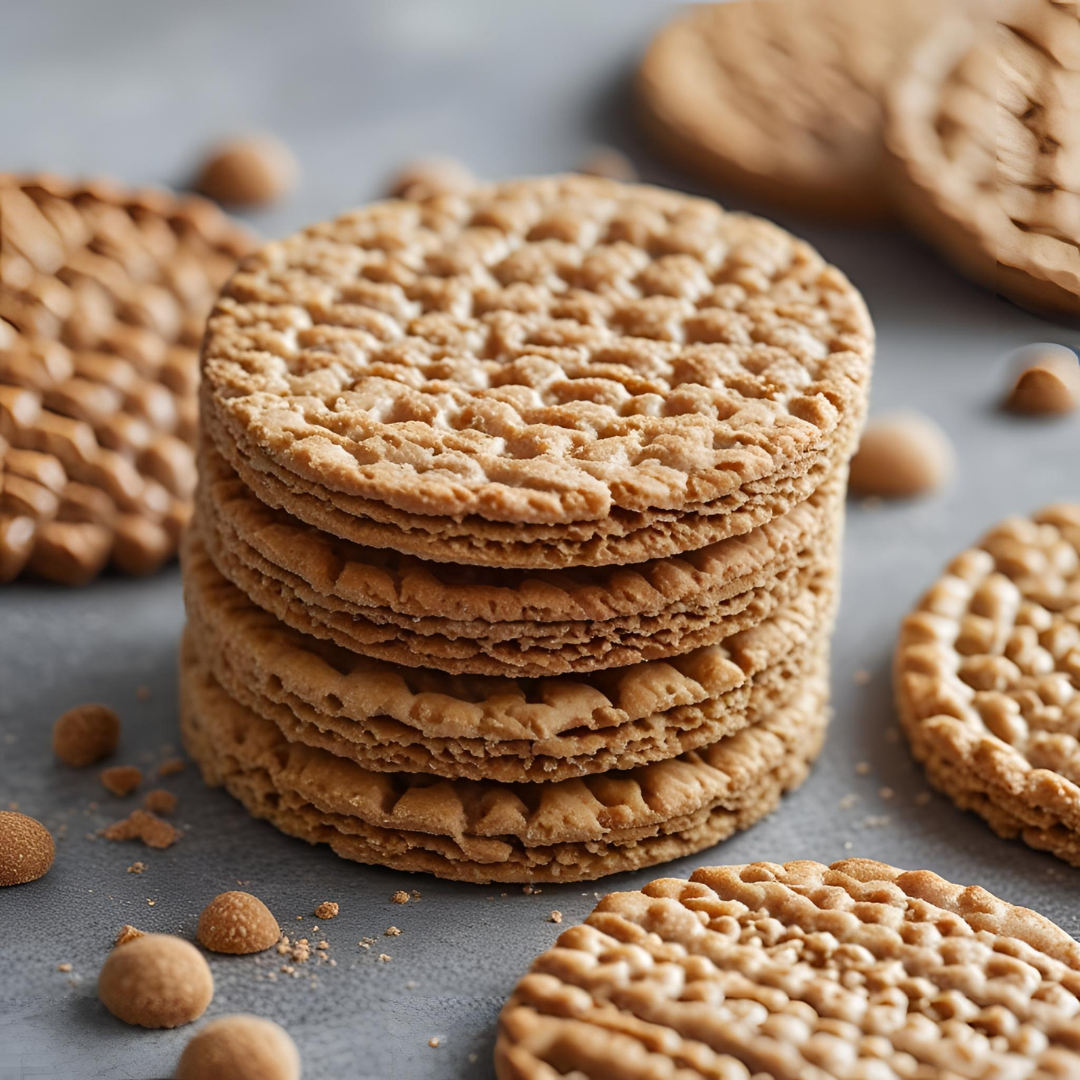What Are Digestive Biscuits?
Digestive biscuits originated in the 19th century in Scotland, created by two doctors who believed the combination of whole wheat and baking soda could aid digestion. The basic recipe combines whole wheat flour, sugar, fat (usually vegetable oil or butter), salt, baking agents, and sometimes bran123. Since then, the simple “digestive” has spun off into many varieties—think chocolate-dipped, oatmeal, or even gluten-free versions.
Digestive biscuits have a crumbly texture and mild, gently sweet flavor, making them a versatile and comforting treat. But what’s actually inside?
Nutritional Profile: Facts at a Glance
Here’s the typical nutritional content for standard digestive biscuits (per 100g)245:
| Nutrient | Amount (per 100g) |
|---|---|
| Energy | 450–480kcal |
| Carbohydrates | 60–65g |
| Sugar | 14–18g |
| Dietary Fiber | 3–7g |
| Fat | 20–22g |
| Saturated Fat | 2–5g |
| Protein | 6–7g |
| Sodium | 400–500mg |
Per biscuit (about 13g):
Key takeaway: Digestive biscuits do offer more fiber than regular cookies, but they still contain significant amounts of sugar, fat, and sodium—sometimes more than you might expect for a “healthy” snack.
The “Digestive” Myth: Do They Really Aid Digestion?
The name “digestive” persists from the biscuit’s origins, when baking soda was thought to ease indigestion. But modern nutrition science finds little evidence that digestive biscuits truly “aid digestion” in a medicinal or therapeutic way456. Here’s why:
-
The Fiber Factor: Most digestive biscuits have 2–3g fiber per serving, which is slightly more than many cookies, but far less than what you’d get from fruit, vegetables, whole grains, or nuts25.
-
Baking Soda Effects: There is not enough baking soda in the average biscuit to provide any real digestive benefit for most people.
-
Marketing vs. Medicine: Ultimately, “digestive” is more marketing than medicine—a comforting name born out of Victorian-era beliefs76.
Pros: When Digestive Biscuits Do Offer Benefits
Digestive biscuits aren’t all bad. Enjoyed occasionally and as part of a balanced diet, they can have a place in your day:
1. Source of Dietary Fiber
-
Slightly higher fiber content (especially in whole-wheat or bran variations) can help with satiety and regularity, though you’d still need much more fiber each day from other foods218.
2. A Wholesome Alternative
-
Compared to sugary cookies or cakes, digestives often use less refined flour and less sugar, making them a slightly “better” convenience snack945.
3. Energy Boost
-
The carbohydrate content gives a quick energy kick, which can be helpful for busy days, hiking, or as a pre-workout snack89.
4. Convenient Portion Control
-
Biscuits are individually portioned, helping you manage how much you eat more easily than a bag of chips or a tray of brownies10.
The Cons: Health Drawbacks of Digestive Biscuits
Despite those modest perks, there are clear reasons not to view digestive biscuits as a health food:
1. Added Sugar
-
Sugar content can be significant—each biscuit usually has 2–5g sugar, sometimes more in flavored or coated varieties264.
-
Consuming high-sugar foods, even in small amounts, is linked to weight gain, blood sugar spikes, and increased risk for metabolic disease if eaten in excess4511.
2. Refined Flours
-
Although advertised as “whole wheat,” many biscuits use semi-refined flour, missing out on the full complement of bran and fiber65.
3. Saturated Fats & Oils
-
Manufactured with vegetable oils or butter, digestives can contain 2–5g saturated fat per biscuit6.
-
Consuming lots of saturated fats is linked to higher cholesterol and heart disease risk over time.
4. Low Nutrient Density
-
Digestive biscuits don’t provide significant levels of vitamins, minerals, or protein25. They’re essentially a source of calories and fast-digesting carbs (with a sprinkle of fiber).
5. Preservatives and Additives
-
Long shelf-life means most are made with synthetic preservatives—a red flag for anyone seeking minimally processed foods6.
6. “Empty Calories”
-
They deliver energy, but not in a nutrient-rich way. The calories don’t offer much satiety, making it easy to overeat, especially alongside tea or coffee.
Digestive Biscuits and Weight Management
Can digestive biscuits help with weight loss? There’s a grain of truth, and a bushel of caveats:
-
Filling, But Only Slightly: The fiber may help curb hunger for a short period, but most people eat more than a serving, nullifying the effect210.
-
Portion Creep: Biscuits are “just one more” territory—you’re unlikely to feel full with a single digestive.
-
Healthier Choices: In the context of a calorie-controlled diet, enjoying one or two as part of a snack (paired with fruit or nuts) can prevent overindulgence elsewhere1011. However, relying on digestives as a primary “health” snack is misguided—stick with fresh whole foods where possible.
When Might Digestive Biscuits Be Helpful?
While not a nutritional superstar, digestives might fit into certain lifestyles or preferences:
-
Quick, Portable Snack: Useful for travel, outdoor activities, or a busy office day.
-
Mild Flavor, Gentle on Stomach: Their simple composition and blandness can be comforting when you’re feeling unwell or recovering from stomach upset.
-
Better Option Than Candy or Frosted Cookies: If your choice is between a digestive biscuit and something more heavily processed or sugar-laden, the digestive will almost always be preferable109.
Comparing Digestive Biscuits with Other Snack Choices
| Snack | Fiber | Sugar | Saturated Fat | Nutrient Density | Satiety |
|---|---|---|---|---|---|
| Digestive Biscuit | 2–3g | 2–5g | 2–5g | Low | Low–Medium |
| Whole Wheat Bread | 6g | 2g | 0.5g | Medium–High | High |
| Granola Bar | 2–6g | 6–12g | 1–4g | Medium | Medium |
| Apple | 4g | 13g | 0g | High | High |
| Almonds (30g) | 4g | 1g | 1g | High | High |
All values per standard serving; for reference only.
Common Myths vs. Facts
-
MYTH: Digestive biscuits significantly improve digestion.
-
MYTH: Digestive biscuits are a good source of vitamins and minerals.
-
MYTH: You can eat as many digestives as you want because they’re “healthy.”
How Many Digestive Biscuits Are “Okay”?
Nutritionists agree: Moderation is key1106.
-
1–2 biscuits per day as part of a balanced, otherwise nutritious diet is generally considered reasonable for most adults.
-
If you’re managing weight, blood sugar, or cholesterol, you may want to keep your intake even lower and opt for whole, unprocessed foods for snacks where possible.
Tip: Always check the label. Sugar, fat, and sodium can vary wildly between brands—and “chocolate” or “flavored” versions usually pack more of all three.
Are Some Digestive Biscuits Healthier Than Others?
Absolutely. Look for varieties that:
-
Use whole grain flour as the first ingredient.
-
Offer lower added sugar (less than 2g per biscuit).
-
Use plant-based oils instead of butter or palm oil (to lower saturated fats).
-
Have minimal artificial additives.
And if you have dietary restrictions (gluten-free, vegan, low-sugar), there are brands that cater to these needs.
Who Should Avoid Digestive Biscuits?
-
Those on strict low-carb or ketogenic diets: Too much sugar and starch.
-
People with celiac disease or gluten sensitivity: Digestive biscuits usually contain gluten, though gluten-free options exist.
-
Anyone needing to limit saturated fat or sodium: Check labels closely or opt for “light” versions.
Healthier Ways to Enjoy Digestive Biscuits
-
Pair with Fruit or Protein: Add some apple slices or a handful of almonds for improved satiety and nutrient density.
-
Stick to Single Pack Servings: Pre-portion your snack so you aren’t tempted to keep munching.
-
Occasional Treat, Not a Staple: Think of digestives like you would other “sometimes” foods—a little goes a long way.
The Bottom Line: Are Digestive Biscuits Good for You?
Digestive biscuits are not a “superfood” nor a direct path to better health or digestion. Their small bump in fiber and use of less-refined flour can make them a smarter choice than many cookies or sweets. But they come with caveats: moderate sugar, saturated fat, and their processed nature mean they’re best enjoyed occasionally and in limited amounts.
If you love digestive biscuits, there’s no need for guilt—just awareness. Include them as a mindful treat, read the labels, and focus the rest of your diet on whole grains, fruits, vegetables, and lean proteins for the real digestive and health benefits.
So, are digestive biscuits good for you? In moderation, as part of a varied diet. But when it comes to true nutrition, real whole foods still win every time.*
Disclaimer: This article is meant for informational purposes and does not replace professional medical or dietary advice. Always consult with a qualified health professional if you have dietary restrictions or health concerns.
Frequently Asked Questions
Do digestive biscuits help with constipation?
Their modest fiber content can support regularity, but you’d need far more fiber daily from other foods for consistent digestive health2.
Can people with diabetes eat digestive biscuits?
With 2–5g of sugar and 9–12g carbs per biscuit, consume with caution, and choose varieties with less added sugar. Always factor them into your total daily carbohydrate limit.
Are digestive biscuits better than regular cookies?
Usually, but only by a small margin—because of whole wheat and slightly higher fiber. Both are still processed, calorie-dense snacks.
Are there homemade alternatives?
Yes! Homemade digestive biscuits allow full control of sugar and fat content, and you can boost the fiber by using whole oats and bran.
References
Content in this article is based on expert nutritionist commentary, contemporary health publications, and recent studies on biscuit consumption and nutrition4121059683.
- https://timesofindia.indiatimes.com/life-style/food-news/love-eating-digestive-biscuits-heres-what-the-nutritionist-says/photostory/103934716.cms
- https://www.stylecraze.com/articles/are-digestive-biscuits-good-for-health/
- https://en.wikipedia.org/wiki/Digestive_biscuit
- https://thegoodbug.com/blogs/news/are-digestive-biscuits-good-for-health-implications
- https://www.onlymyhealth.com/can-digestive-biscuits-really-serve-your-health-1438948537
- https://www.thehealthsite.com/fitness/are-digestive-biscuits-healthy-heres-the-truth-z0816-425994/
- https://www.reddit.com/r/AskUK/comments/yqw9nx/is_it_dangerous_to_eat_a_lot_of_mcvities/
- https://www.satoriaagro.com/what-are-the-benefits-of-digestive-biscuits/
- https://zamprimestore.com/exploring-the-nutritional-benefits-of-mcvities-original-digestive-biscuits/
- https://toneop.com/blog/benefits-of-digestive-biscuits-for-weight-loss
- https://www.joinelevatenow.com/blogs/diet/which-biscuit-is-good-for-weight-loss
- https://doctor.ndtv.com/living-healthy/heres-why-digestive-biscuits-may-not-be-as-healthy-as-you-think-1810241
- https://www.delicious.com.au/food-files/article/digestive-biscuits-actually-good-gut/ud5gkr8h
- https://checkyourfood.com/ingredients/ingredient/331/digestive-biscuits
- https://www.telegraph.co.uk/health-fitness/diet/nutrition/what-eating-biscuits-every-day-really-does-to-your-health/
- https://pmc.ncbi.nlm.nih.gov/articles/PMC10529723/
- https://papadopoulou.gr/en/product/digestive-bicuits/
- https://www.reddit.com/r/ireland/comments/v09xyd/how_many_digestive_biscuits_is_acceptable_to_eat/
- https://food.ndtv.com/weight-loss/think-digestive-biscuits-are-healthy-think-again-nutritionist-spills-the-tea-4406569
- https://timesofindia.indiatimes.com/life-style/health-fitness/photo-stories/3-reasons-why-digestive-biscuits-are-not-at-all-healthy/photostory/62757163.cms








